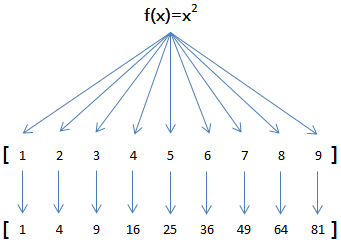Python中的map()函数和reduce()函数的用法
Python内建了map()和reduce()函数。
如果你读过Google的那篇大名鼎鼎的论文“MapReduce: Simplified Data Processing on Large Clusters”,你就能大概明白map/reduce的概念。
我们先看map。map()函数接收两个参数,一个是函数,一个是序列,map将传入的函数依次作用到序列的每个元素,并把结果作为新的list返回。
举例说明,比如我们有一个函数f(x)=x2,要把这个函数作用在一个list [1, 2, 3, 4, 5, 6, 7, 8, 9]上,就可以用map()实现如下:

现在,我们用Python代码实现:
>>> def f(x): ... return x * x ... >>> map(f, [1, 2, 3, 4, 5, 6, 7, 8, 9]) [1, 4, 9, 16, 25, 36, 49, 64, 81]
map()传入的第一个参数是f,即函数对象本身。
你可能会想,不需要map()函数,写一个循环,也可以计算出结果:
L = [] for n in [1, 2, 3, 4, 5, 6, 7, 8, 9]: L.append(f(n)) print L
的确可以,但是,从上面的循环代码,能一眼看明白“把f(x)作用在list的每一个元素并把结果生成一个新的list”吗?
所以,map()作为高阶函数,事实上它把运算规则抽象了,因此,我们不但可以计算简单的f(x)=x2,还可以计算任意复杂的函数,比如,把这个list所有数字转为字符串:
>>> map(str, [1, 2, 3, 4, 5, 6, 7, 8, 9]) ['1', '2', '3', '4', '5', '6', '7', '8', '9']
只需要一行代码。
再看reduce的用法。reduce把一个函数作用在一个序列[x1, x2, x3...]上,这个函数必须接收两个参数,reduce把结果继续和序列的下一个元素做累积计算,其效果就是:
reduce(f, [x1, x2, x3, x4]) = f(f(f(x1, x2), x3), x4)
比方说对一个序列求和,就可以用reduce实现:
>>> def add(x, y): ... return x + y ... >>> reduce(add, [1, 3, 5, 7, 9]) 25
当然求和运算可以直接用Python内建函数sum(),没必要动用reduce。
但是如果要把序列[1, 3, 5, 7, 9]变换成整数13579,reduce就可以派上用场:
>>> def fn(x, y): ... return x * 10 + y ... >>> reduce(fn, [1, 3, 5, 7, 9]) 13579
这个例子本身没多大用处,但是,如果考虑到字符串str也是一个序列,对上面的例子稍加改动,配合map(),我们就可以写出把str转换为int的函数:
>>> def fn(x, y):
... return x * 10 + y
...
>>> def char2num(s):
... return {'0': 0, '1': 1, '2': 2, '3': 3, '4': 4, '5': 5, '6': 6, '7': 7, '8': 8, '9': 9}[s]
...
>>> reduce(fn, map(char2num, '13579'))
13579
整理成一个str2int的函数就是:
def str2int(s):
def fn(x, y):
return x * 10 + y
def char2num(s):
return {'0': 0, '1': 1, '2': 2, '3': 3, '4': 4, '5': 5, '6': 6, '7': 7, '8': 8, '9': 9}[s]
return reduce(fn, map(char2num, s))
还可以用lambda函数进一步简化成:
def char2num(s):
return {'0': 0, '1': 1, '2': 2, '3': 3, '4': 4, '5': 5, '6': 6, '7': 7, '8': 8, '9': 9}[s]
def str2int(s): return reduce(lambda x,y: x*10+y, map(char2num, s))
也就是说,假设Python没有提供int()函数,你完全可以自己写一个把字符串转化为整数的函数,而且只需要几行代码!
练习
利用map()函数,把用户输入的不规范的英文名字,变为首字母大写,其他小写的规范名字。输入:['adam', 'LISA', 'barT'],输出:['Adam', 'Lisa', 'Bart']。
Python提供的sum()函数可以接受一个list并求和,请编写一个prod()函数,可以接受一个list并利用reduce()求积。

Hot AI Tools

Undresser.AI Undress
AI-powered app for creating realistic nude photos

AI Clothes Remover
Online AI tool for removing clothes from photos.

Undress AI Tool
Undress images for free

Clothoff.io
AI clothes remover

AI Hentai Generator
Generate AI Hentai for free.

Hot Article

Hot Tools

Notepad++7.3.1
Easy-to-use and free code editor

SublimeText3 Chinese version
Chinese version, very easy to use

Zend Studio 13.0.1
Powerful PHP integrated development environment

Dreamweaver CS6
Visual web development tools

SublimeText3 Mac version
God-level code editing software (SublimeText3)

Hot Topics
 Google AI announces Gemini 1.5 Pro and Gemma 2 for developers
Jul 01, 2024 am 07:22 AM
Google AI announces Gemini 1.5 Pro and Gemma 2 for developers
Jul 01, 2024 am 07:22 AM
Google AI has started to provide developers with access to extended context windows and cost-saving features, starting with the Gemini 1.5 Pro large language model (LLM). Previously available through a waitlist, the full 2 million token context windo
 How to download deepseek Xiaomi
Feb 19, 2025 pm 05:27 PM
How to download deepseek Xiaomi
Feb 19, 2025 pm 05:27 PM
How to download DeepSeek Xiaomi? Search for "DeepSeek" in the Xiaomi App Store. If it is not found, continue to step 2. Identify your needs (search files, data analysis), and find the corresponding tools (such as file managers, data analysis software) that include DeepSeek functions.
 How do you ask him deepseek
Feb 19, 2025 pm 04:42 PM
How do you ask him deepseek
Feb 19, 2025 pm 04:42 PM
The key to using DeepSeek effectively is to ask questions clearly: express the questions directly and specifically. Provide specific details and background information. For complex inquiries, multiple angles and refute opinions are included. Focus on specific aspects, such as performance bottlenecks in code. Keep a critical thinking about the answers you get and make judgments based on your expertise.
 How to search deepseek
Feb 19, 2025 pm 05:18 PM
How to search deepseek
Feb 19, 2025 pm 05:18 PM
Just use the search function that comes with DeepSeek. Its powerful semantic analysis algorithm can accurately understand the search intention and provide relevant information. However, for searches that are unpopular, latest information or problems that need to be considered, it is necessary to adjust keywords or use more specific descriptions, combine them with other real-time information sources, and understand that DeepSeek is just a tool that requires active, clear and refined search strategies.
 How to program deepseek
Feb 19, 2025 pm 05:36 PM
How to program deepseek
Feb 19, 2025 pm 05:36 PM
DeepSeek is not a programming language, but a deep search concept. Implementing DeepSeek requires selection based on existing languages. For different application scenarios, it is necessary to choose the appropriate language and algorithms, and combine machine learning technology. Code quality, maintainability, and testing are crucial. Only by choosing the right programming language, algorithms and tools according to your needs and writing high-quality code can DeepSeek be successfully implemented.
 How to use deepseek to settle accounts
Feb 19, 2025 pm 04:36 PM
How to use deepseek to settle accounts
Feb 19, 2025 pm 04:36 PM
Question: Is DeepSeek available for accounting? Answer: No, it is a data mining and analysis tool that can be used to analyze financial data, but it does not have the accounting record and report generation functions of accounting software. Using DeepSeek to analyze financial data requires writing code to process data with knowledge of data structures, algorithms, and DeepSeek APIs to consider potential problems (e.g. programming knowledge, learning curves, data quality)
 The Key to Coding: Unlocking the Power of Python for Beginners
Oct 11, 2024 pm 12:17 PM
The Key to Coding: Unlocking the Power of Python for Beginners
Oct 11, 2024 pm 12:17 PM
Python is an ideal programming introduction language for beginners through its ease of learning and powerful features. Its basics include: Variables: used to store data (numbers, strings, lists, etc.). Data type: Defines the type of data in the variable (integer, floating point, etc.). Operators: used for mathematical operations and comparisons. Control flow: Control the flow of code execution (conditional statements, loops).
 Problem-Solving with Python: Unlock Powerful Solutions as a Beginner Coder
Oct 11, 2024 pm 08:58 PM
Problem-Solving with Python: Unlock Powerful Solutions as a Beginner Coder
Oct 11, 2024 pm 08:58 PM
Pythonempowersbeginnersinproblem-solving.Itsuser-friendlysyntax,extensivelibrary,andfeaturessuchasvariables,conditionalstatements,andloopsenableefficientcodedevelopment.Frommanagingdatatocontrollingprogramflowandperformingrepetitivetasks,Pythonprovid






